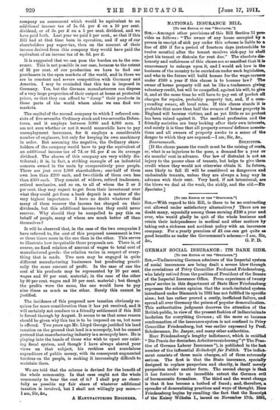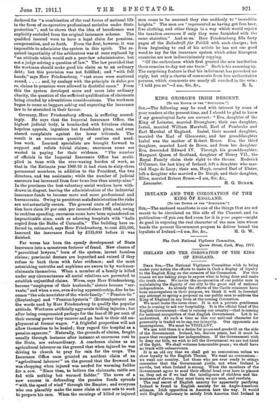GERMAN SOCIAL INSURANCE : ITS DARK SIDE. [To THE EDITOR
OF THE "SPECTATOR."] Sre,—Undiseerning German admirers of the Imperial system of social insurances are being dealt a severe blow through the revelations of Privy Councillor Ferdinand Friedensburg, who lately retired from the position of President of the Senate of the Imperial Insurance Office. From experience of twenty years' service in this department of State Herr Friedensburg expresses the solemn opinion that the much-imitated system introduced under Bismarck in 1881 has not fulfilled its specific aims ; but has rather proved a costly, inefficient failure, and spread all over Germany the poison of popular demoralization. This authoritative judgment deserves the attention of the British public, in view of the present fashion of indiscriminate laudation for everything German ; all the more so because condemnation of the insurance system is not confined to Privy Councillor Friedensburg, but was earlier expressed by Prof. Scholermann, Dr. Jasper, and many other authorities.
Herr Friedensburg's lengthy indictment, which is entitled " Die Praxis der deutschen Arbeiterversicherttng" (" The Prac- tice of German Labour Insurance "), is published in the last number of the influential Zeitschrift fur Politik. The indict- ment consists of three main charges, all of them extremely serious. The first is that the State insurance, specially designed to replace pauperism and charity, is itself merely pauperism under another form. The second charge is that it has fostered to an incredible extent the German evil of bureaucratic formalism. The third and the worst charge is that it has become a hotbed of fraud; and, therefore, a spreader of demoralizing practices and ways of thought. Herr Friedensburg begins by recalling tile fact that the Rescript of the Kaiser Wilhelm L, issued on November 17th. 1881,
declared for "a combination of the real forces of national life in the form of co-operative professional societies under State protection"; and be shows that the idea of beneficence was explicitly excluded from the original insurance scheme. The qualified insured were to have a legal claim for pensions, compensation, and so forth. From the first, however, it was impossible to administer the system in this spirit. The re- quired impartiality of the arbitrators was at once replaced by "an attitude which would suit a poor-law administrator, but not a judge solving a question of law." The law provided that the workman should make good his claim as to an ordinary debt; but this provision was not fulfilled; and "with full hands," says Herr Friedensburg, "vast sums were scattered round and, by analogy with the principle in dubio pro re, claims to pensions were allowed in doubtful cases." From this the system developed more and more into ordinary charity, the question of the sufficient qualification of claimants being clouded by adventitious considerations. The workmen began to come as beggars asking and expecting the insurance law to be stretched in their favour.
Germany, Herr Friedensburg affirms, is suffering accord- ingly. He says that the Imperial Insurance Office, the highest judicial body, is bombarded with frivolous claims, hopeless appeals, ingenious but fraudulent pleas, and even absurd complaints against the lower tribunals. The result is an enormous quantity of routine and need- less work. Learned specialists are brought forward to support and refute trivial claims; enormous sums are wasted in paying for their evidence. " The number of officials in the Imperial Insurance Office has multi- plied in tune with the ever-waxing burden of work, so that in the Estimate year 1909-10 it had risen to sixty-three permanent members, in addition to the President, the two directors, and ten assistants ; while the number of judicial assessors has increased from four to no less than ninety-nine." In the provinces the best voluntary social workers have with- drawn in disgust, leaving the administration of the industrial insurance funds to become more and more professional and bureaucratic. Owing to persistent maladministration the risks are not actuarially secure. The general costs of administra- tion have risen 50 per cent. per insured since 1888, and, owing to reckless spending, enormous sums have been squandered on impracticable aims, such as adorning hospitals with "halls copied from the Baths of Caracalla." The building here re- ferred to, estimated, says Herr Friedensburg, to cost £25,000, lessened the insurance fund by £135,000 before it was finished.
Far worse has been the speedy development of State insurance into a monstrous fosterer of fraud. New classes of "parasitical lawyers," born of the system, invent baseless claims ; provincial doctors are boycotted and ruined if they refuse to back them with false evidence ; and the most astonishing untruths and sophisms are sworn to by workmen- claimants themselves. When a member of a family is killed under any circumstances all social relations are perverted to establish unjustified claims. Wives, says Herr Friedensburg, become "employees of their husbands," sisters become " ser- vants," and when a son, even during apprenticeship, dies he be- comes "the sole nourisher of the whole family." " Pension-lie " (Rentenluge) and "Pension-hysteria" (Rentenhysterie) are the words used by Herr Friedensburg to qualify the popular attitude. Workmen artificially aggravate trifling injuries ; but after being compensated perhaps for the loss of 30 per cent. of their earning power they recover and go back to their old em- ployment at former wages. "A frightful proportion will not allow themselves to be healed ; they regard the hospital as a pension-squeezer." Naturally, the grounds of claims, fought usually through instance after instance at enormous cost to the State, are extraordinary. A coachman claims as an agricultural labourer on the ground that when injured he was driving to church to pray for rain for the crops. The Insurance Office once granted an accident claim of an "agricultural labourer" on the ground that the firewood he was chopping when injured was needed for warming fodder for a cow. "Since then, to believe the claimants, cattle are fed with nothing but warmed fodder." The news of a new success in defrauding the pension funds spreads " with the speed of wind" through the Empire; and everyone who can plausibly make the same claim at once sets to work to prepare his case. When the earnings of killed or injured
men come to be assessed they rise suddenly to " incredible heights." The men are " represented as having got free beer, free clothing, and other things in a way which would rejoice the taxation assessors if only they were furnished with the same statistics." And so on. Herr Friedensburg fills forty pages of the Zeitschrift frir Politik with such charges ; but from beginning to end of his article be has not one good word to say for the insurance system which other European countries are now indiscriminately copying.
" Of the enthusiasm which first greeted the new institution there remains to-day not one trace." Such is his summing up. The surprising feature is that his indictment has provoked no reply, but only a chorus of comments from less authoritative persons, which comments are nearly all couched iu the vein : " I told you so."—I am, Sir, &c., R. L.











































 Previous page
Previous page